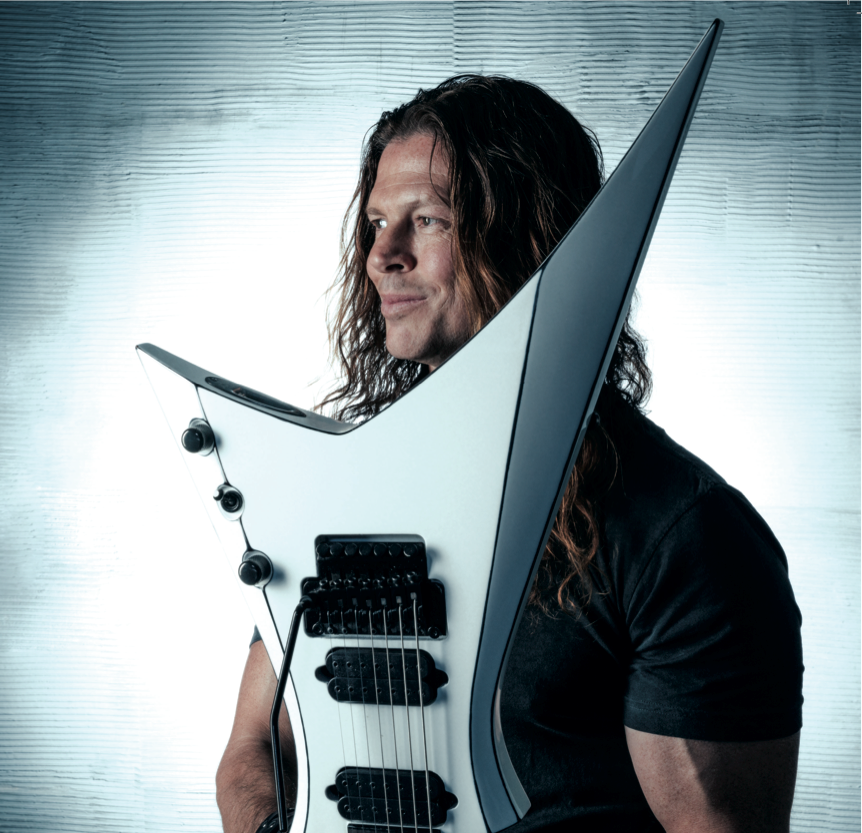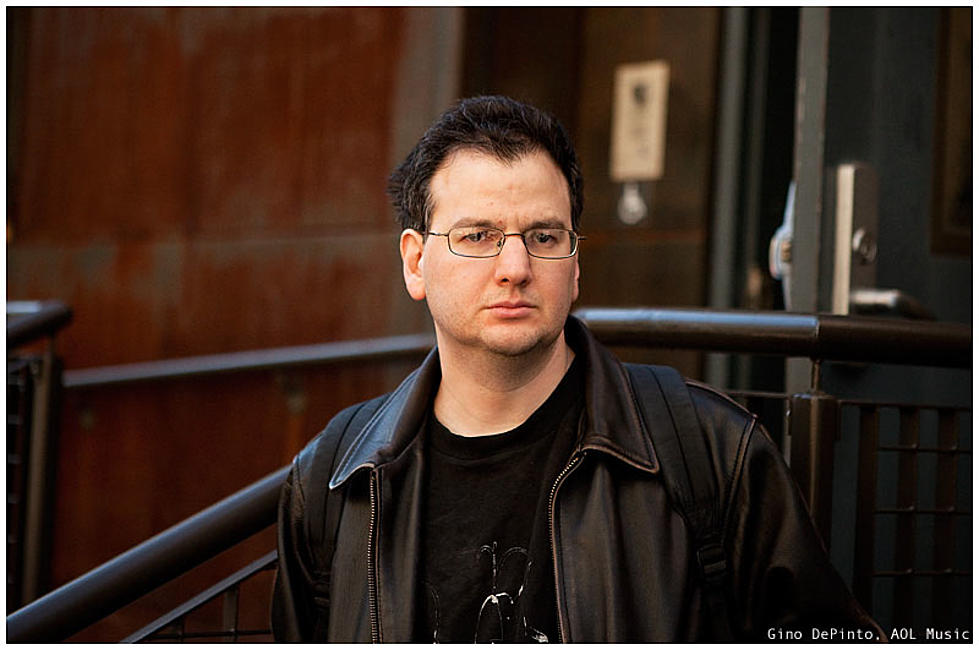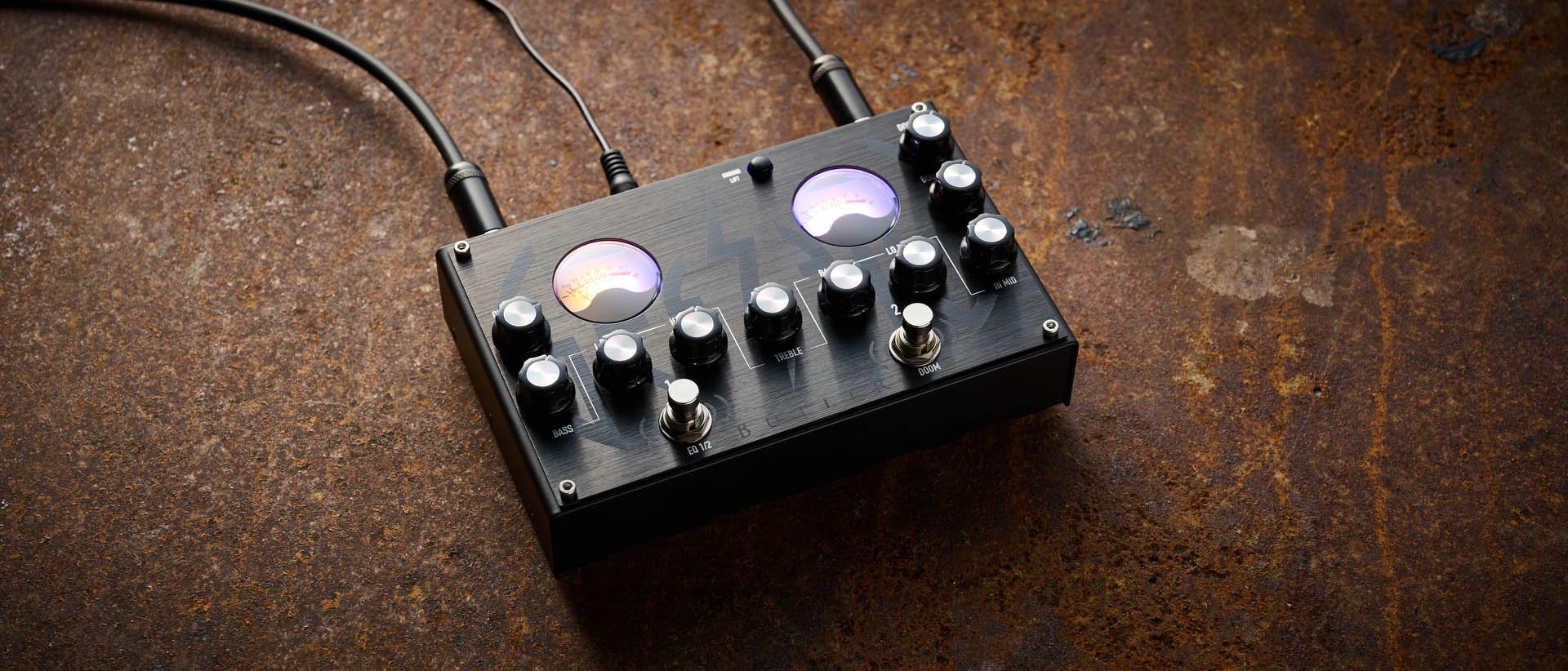Chris Broderick Discusses His Years with Megadeth, Act of Defiance's Debut Album

Being a hired gun has its advantages for a guitarist that just wants to play and doesn’t need the responsibility of writing songs, choosing what gets recorded and dealing with record label bean counters.
But for ex-Megadeth guitarist Chris Broderick, rocking out to someone else’s tunes night after night wasn’t enough. So on November 25, six hours after drummer Shawn Drover left the band, Broderick told Dave Mustaine he, too, was quitting.
“The decision was a long time in the making,” Broderick says, sitting poolside at his Los Angeles home. “Being in Megadeth was great for my career, but I wanted to have some creative freedom and some freedom in how I presented myself.”
Broderick replaced Megadeth’s guitarist Glen Drover in 2008 and played on three of the band’s studio albums, three live releases and never missed a tour. For almost six years he dedicated most of his time to Megadeth and had no fallback plans.
Then, during a conversation with Drover, the two decided to use a batch of material they had written for Megadeth as the launching point for a new band, Act of Defiance. The two quickly wrote 10 songs that were considerably heavier and more musically intricate than anything they had played for years.
To complete the lineup, they hired Scar the Martyr vocalist Henry Derek Bonner and ex–Shadows Fall guitarist Matt Bachand on bass. Then with the help of Chris “Zeuss” Harris, Act of Defiance assembled Birth and the Burial, a crushing technical metal album that offers more musical diversity than Broderick revealed in Megadeth.
“Thy Lord Belial” is fast and unrelenting, pausing only for a call-and-response chorus, “Refrain and Refracture” starts with an acoustic arpeggio over a neo-classical lead and features a melodic rhythm redolent of Killswitch Engage and “Poison Dream" builds from classical piano and strings into an epic multi-faceted thrasher.
All the latest guitar news, interviews, lessons, reviews, deals and more, direct to your inbox!
“The sound of Act of Defiance is kind of like if you invited every genre of metal together to go to a concert and mosh in a pit, whether it’s old-school thrash to death metal to Scandinavian black metal and everything in between. There are elements of all those types of metal. And I love that about it.”
In a candid, articulate interview, Broderick talks about his years with Megadeth, the rules of being in that band, how he and Drover assembled Act of Defiance, why he hired a guitarist to play bass and the unconventional recording process for Birth and the Burial.
Shawn Drover recommended you to Dave Mustaine in 2008 after his brother Glen left the band and Glen, who left Megadeth on good terms, endorsed you. How did you know the Drovers and did either of them call you to let you know you were being considered?
They knew me from Nevermore, but I didn’t hear anything from them until I was in the band. Management called totally out of the blue. I didn’t know what to make of it. I almost thought it was a prank at first. They wanted me to meet with Dave first and then audition.
Had you been a Megadeth fan?
I had no idea where they were at their career at that point, so I had no expectations. I just thought it was a great opportunity so I jumped at it.
Did you think you’d be able to provide creative input into the band?
I knew I wouldn’t be able to demand anything. I saw it as a great job and I allowed my employer to dictate the terms. It’s not like when you’re a teenager and you get together with your friends and you’re like, “Ahhh, partners for life!” I wish it was like that, but it definitely wasn’t. There is a hierarchy after a band is established and has a legacy.
Were you comfortable in that role?
I loved playing for the crowd. When you walk onstage and the crowd is having a good time, it’s great.
Did Mustaine tell you what to play and how to play it?
When we did songs from the back catalog I was playing another guitarist’s parts, whether it was Chris Poland, Marty Friedman or Jeff Young. So I played like they did and Dave did his part. That always worked out really well. As far as the albums I played on, Dave designated the solo spots and he had some input in what I could or could not do.
Was there a dress code in Megadeth?
There definitely was a dress code that he wanted to maintain for a Megadeth look. For me, with everything in this camp, I saw very early on that Dave is the owner of the company and he is the one that has the right to say how the company is presented and how it should look. The only time we had any issues was when I didn’t know a specific thing about how he wanted my appearance to be, and then I would find out as we went along. I saw it very early on as a job requirement and I felt that if the job is worth it to me then I would make those changes.
On the first tour you did with Megadeth you played a seven-string guitar, which is what you play now. But for the rest of your tenure with the band you played a six-string. Did that work better for the music you were playing?
Dave felt a seven-string guitar wasn’t an original thrash metal instrument. Therefore he felt it would be better if I used six strings.
Had you considered leaving the band in the past?
I was constantly weighing the positives against the negatives. I likened it to a lawyer that’s working for a firm and finally wants to break out and start his own firm or a chef that wants to open up his own restaurant. You have to deal with the corporate mannerisms from the company you’re working for. And once it gets to a point where you feel like you would be happier on your own, that’s when you finally to cut the cord. I had been thinking about what to do for a long time, but up until I decided to leave, I always felt the positives outweighed the negatives.
When did that balance tip?
Not until the last quarter of 2014. I was dwelling on my lack of musical creativity in the band. Dave was getting ready to go in and do another CD and my heart just wasn’t in it because I knew I wasn’t going to have any artistic say in the definition of the album and the music. He was calling saying, “Hey, I want to get you guys down there.” The last thing I wanted to do was go down there and work on a partial CD and then say, “Hey, this isn’t for me.” It was just the right time to leave.
Had you and Shawn talked about leaving Megadeth and forming a new band?
It’s funny. Shawn and I felt exactly the same way, but we didn’t think about putting together a band together until after we had both left. When Shawn told me he was going to quit I was a bit shocked and surprised. [Bassist] Dave Ellefson called me right away and went, “Dude, Shawn just quit!" I talked to him for a while, and then I thought about my own situation. I bounced it off my friends and family and decided it was the right thing for me to do as well.
Did Dave try to convince you to stay?
No, no. Once a decision like that is made, it’s best just to move on.
When did you and Shawn decide to start working on Act of Defiance?
Obviously, Shawn and I stayed in contact, and not long after we both left we realized there was all this great music we’d written for Megadeth that didn’t get used. So we thought, Why don’t we put something together and get it out there?
Are any of these songs about experiences you had In Megadeth or ways you felt about leaving the band?
Just like with anybody, they draw on all of our experiences. They’re about my experiences in life, in Megadeth, in my guitar playing. Everything I do reflects in my lyrics.
Did you want to write songs that didn’t sound anything like Megadeth?
No, we just wanted the writing to be natural. I like to write complex parts and keep them in that heavy, thrashy realm, but I also really like extreme Scandinavian black metal. And Shawn listens to Cannibal Corpse all day long, so we wanted to get some of that in there, too.
Did the music come easily?
Some songs came together quicker than others. There were nights where I was spending much more time in my studio than anywhere else. But it was really satisfying to work with material that I had created. When I worked on Shawn’s songs we used mostly his riffs, which was fine. It was a real collaboration, which was exciting. And for the album we ended up using five of his songs and five of mine.
Did you work with Shawn’s drum parts?
Not for my songs. I used Toontrack Superior Drummer. It makes demoing extremely easy and gave Shawn a clear idea of what I was thinking. But there were a lot of times he would say, “Hey, I was thinking this other kind of beat would work better,” and most of the time a drummer’s going to have a better idea of what the drums should do than a guitarist. His songs had guitar parts, too, because he can hold his own as a guitarist, and he got his brother Glen to help out with some of the guitar tones at first, and definitely with the production.
The album is cohesive, which is impressive considering you incorporated so many styles of metal in there and wrote and recorded the songs hundreds of miles apart from one another.
It’s amazing what you can do these days by trading files digitally. Shawn and I have a really good working chemistry from years of playing together. We each wrote five songs on our own, then we bounced them off each other. Sometimes we made minimal changes, like switching a chord or two to make it sound a little bit darker, but that’s about it.
You wrote and recorded on a seven-string?
I have my signature series Jackson Soloist that I used along with a couple of prototypes that I had Jackson build for me. They were all seven-strings. I’ve always been a traditional seven-string guitarist so it was great to be able to get back to that and get the sounds I love.
Did you want a different guitar tone than what you had in Megadeth?
Just like every other musician, I am very opinionated about what I think is the perfect sound. So it was awesome to have the freedom to use the tones that I really love. I have a number of amps that I use, whether it’s Engl or the Fender 5150 III, but in the end I wound up recording this entire album with my Fractal Audio Axe-Fx II.
Why did you decide to use an amp simulator when you have the equipment to record with mikes and amps?
The Fractal sounds amazing to me. That technology has come such a long way and the ability that it has to give you such a clean and clear recording, and the convenience just made it a hands-down win. I liken it to photography. Do you see anyone shooting film these days?
Did you pre-write your leads?
Well, I actually start with the rhythm. I like rhythms that support leads really well. If you’re going to have a solo, you might as well not be soloing over some random rhythm. So I constructed rhythms in a way that supported either a melodic or harmonic depth. Then I would listen to it and imagine what I wanted to hear. That’s when it would start to come to life for me.
Once you have an idea in mind do your solos tend to come quickly and spontaneously?
No, I spend a lot of time on my leads, but there are times when I spend a lot of time on a lead because I want it to sound spontaneous and off the cuff. If you want it to sound more anxious you rush ahead of the beat a little bit. And if you want it to sound more lackadaisical and you want it to seem like you were just thinking about getting to that note and you barely got to it in time, you play a little bit behind the beat. So for me it’s a very musical process because it starts with what I imagine, but then when it comes time to execute, it becomes a very thoughtful process.
Birth and the Burial features guitar harmonies and there’s always a rhythm guitar playing along with the solos. Did you consider working with a second guitarist?
I really enjoy working with another guitar player, but this band came together so quickly and was so much about writing the music and then getting a vocalist and bassist that we never considered hiring a second guitarist. Depending on how touring goes, I’m thinking of bringing a second guitarist out with us, but we’ll see.
Did you know Scar the Martyr vocalist Henry Derek before you hired him to sing?
We didn’t. We put together a list of 30 singers we thought might work for us and then narrowed them down to five. We contacted everyone to see if they were interested and then sent them a demo and had them add vocals. Henry was hands-down the one whose vocals suited the music the best. He’s very talented at screaming and singing. So he came to my studio and we tracked all the vocals there, along with all the guitars, cello and piano.
It’s odd that you hired Shadows Fall guitarist Matt Bachand to play bass.
Shawn reached out to Matt when we got to the point where we were thinking about having a permanent member onstage. Matt’s a great vocalist, a great guitarist and he showed us that he can lay down great bass lines as well. He did a lot of songwriting on all of those Shadows Fall records and in reality, Matt’s probably got as much or more touring experience than any of us.
Did Matt play on Birth and Burial?
He recorded bass lines for all 10 tracks at his place. I laid down some of the initial bass tracks on the demo versions and sent them to him and he substituted them with these great parts that sound like real bass lines. They’re not just doubling the guitar line.
What was the greatest obstacle you’ve faced with Act of Defiance?
Time. We all thought we’d have all the time we needed. We even thought we were ahead of the game because we started with the stuff we didn’t use in Megadeth. But once you bring a record label into the picture then you have to commit to a release date that’s not too late in the year and all of a sudden your back is against the wall.
We started working on the songs at the beginning of December. I demoed vocals with Henry in January and by February Shawn was tracking his drums. That left March and April to record all the guitars, vocals and bass. We had the album finished at the end of April, ready to be mastered. So we did the whole thing in about five months.
You recorded tracks in three different studios, then handed all the songs to Zeuss to mix and master. Did he change the sound of the songs?
At first, Shawn and I were both concerned that the songs might not sound so cohesive. When Zeuss recorded Shawn’s drums, he provided input to make the parts even better. And then he took all the rest of the tracks we did and mixed them so well that it sounds like we all wrote and recorded everything in the same room.
Is it scary going from an established band to being back in a position where you have to prove yourself?
It might make me a little anxious if I knew I had any control over it. But I don’t, so it’s not worth wasting my time thinking about it. The only thing I can do is promote the band and do the best I can performing these songs. Anything else is wasted energy.
Jon is an author, journalist, and podcaster who recently wrote and hosted the first 12-episode season of the acclaimed Backstaged: The Devil in Metal, an exclusive from Diversion Podcasts/iHeart. He is also the primary author of the popular Louder Than Hell: The Definitive Oral History of Metal and the sole author of Raising Hell: Backstage Tales From the Lives of Metal Legends. In addition, he co-wrote I'm the Man: The Story of That Guy From Anthrax (with Scott Ian), Ministry: The Lost Gospels According to Al Jourgensen (with Al Jourgensen), and My Riot: Agnostic Front, Grit, Guts & Glory (with Roger Miret). Wiederhorn has worked on staff as an associate editor for Rolling Stone, Executive Editor of Guitar Magazine, and senior writer for MTV News. His work has also appeared in Spin, Entertainment Weekly, Yahoo.com, Revolver, Inked, Loudwire.com and other publications and websites.

